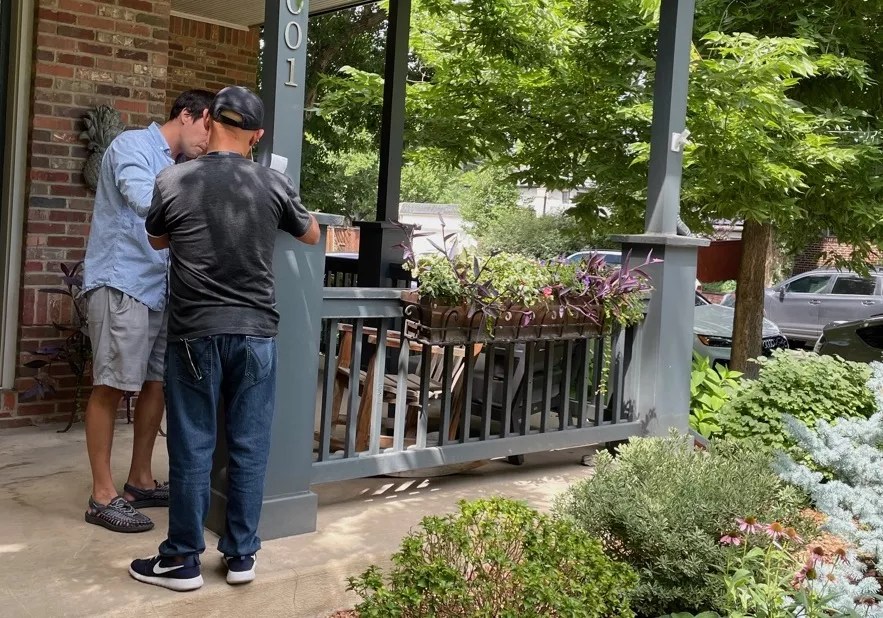
Courtesy of Doobba

Audio By Carbonatix
When a handful of new marijuana delivery companies began popping up in the Denver area this year, some budding entrepreneurs let themselves become optimistic. Local rules in Aurora and Denver, the only two major cities that now allow recreational pot delivery, mandate that delivery licensees must involve business owners from communities that were harmed by the drug war, and both cities were receiving interested applicants. But since the early interest, marijuana deliveries have moved to the slow lane.
Doobba, Denver’s first social equity applicant for a delivery service, is currently working with just two dispensaries after launching in August, even though it talked with several stores in the past year. According to co-founder Ari Cohen, most Denver-area delivery companies are receiving a lot of nibbles but no bites, with fewer than two dozen dispensaries between the two cities opting into the service. We caught up with Cohen to learn more about the slow start, and how much longer small delivery businesses can survive at the current rate.
Westword: How’s delivery been going since you launched?
Ari Cohen: It’s still kind of slow. It hasn’t been picking up. Unfortunately, the first dispensary we’ve worked with brought in competition, another social equity delivery company that delivers out of the same store – except they’re doing it for free to the consumer. So we’ve mutually decided to part ways with Strawberry Fields at the end of December and are going to continue delivering for Mighty Tree and complete our deal with Seed & Smith, who’ve been caught up with a new store and grow that they’re opening.
It really is off to a slow start for us as a company, but it’s not unique for our business. All of the delivery companies are experiencing this, from my understanding. Some are struggling to garner contracts from stores. I don’t want to say stores are playing games with social equity licensees, but they are trying to get a feel for what everyone’s offering – which is fair – but it feels like they’re trying us all on for size without actually buying anything.

Doobba founder Ari Cohen says pot delivery’s acceleration has been slow.
Courtesy of Ari Cohen
Did you anticipate a slow start and a lukewarm reception from dispensaries after delivery started?
I did expect a tentative response from dispensaries and apprehension on their end, whether they’re not sure what to do with it right now or they want to try to bring it in as an internal operation. I still didn’t expect it to be as slow as it is, and hoped it would’ve picked up by now, but that’s just the way it is.
Do you think the social equity requirement is playing a part in delivery’s initial reception among dispensaries?
No. I think a lot of dispensaries are just scared of delivery, and others wish they could do it on their own. We probably wish we could do it on our own, too, in terms of sales and everything, so it’s an imperfect situation. Making a social equity delivery company have to partner with a store really puts the stores in control. We’re at the behest of the store, and they can hold out. The exclusivity time for delivery is only three years [in Denver], and one year has almost passed already.
We’ve only been in operation for a few months before a year has gone by, so we really only have two years of operation exclusivity. It’s not enough. Big companies can sit on the sidelines and wait and build up software systems and apps, then test it out for two years. It’s not a long time for our businesses.
Do you know of dispensaries currently waiting out delivery like that?
Yes. Some stores are waiting to do it internally. I think extending that exclusivity is something that myself and other social equity licensees have brought up for delivery. It’s six years for cultivation, retail and production manufacturing [in Denver], but it’s only three years for delivery.
How would the delivery market be affected if some of the bigger chains jumped in?
I think it would help the climate a lot. Larger stores have a much deeper client base and much more exposure. Even a small sliver from a store with 10,000 or 20,000 established customers would still be substantial for delivery, but 10 percent of customers from smaller stores isn’t that big for delivery.
How much do you currently charge for delivery fees?
We charge $19.99.
What’s the feedback been on that?
I haven’t had much negative feedback from it. We heard from some customers from California that it was too high, but I’ve noticed our customers with East Coast phone numbers don’t mind the delivery fee as much. We have a pretty good retention rate with our customers, over 60 percent. Our average ticket is going up, too.
We can’t deliver a $10 pre-roll for free. We have a minimum of $40 before making the delivery, so it’s more for people who are wanting to spend money. I’m not disparaging anyone, but I pay my drivers $18 an hour, not $9 and consumer tips.
How long can you continue as a new business at the current rate?
Not long. You have to make money here, or you can’t do it. We don’t want to take big-money outside investors and burn a lot of money. We have a long runway, but at some point the runway ends, and you have to put the plane back. But we’re looking at smaller investors and some new partnerships that could be interesting.